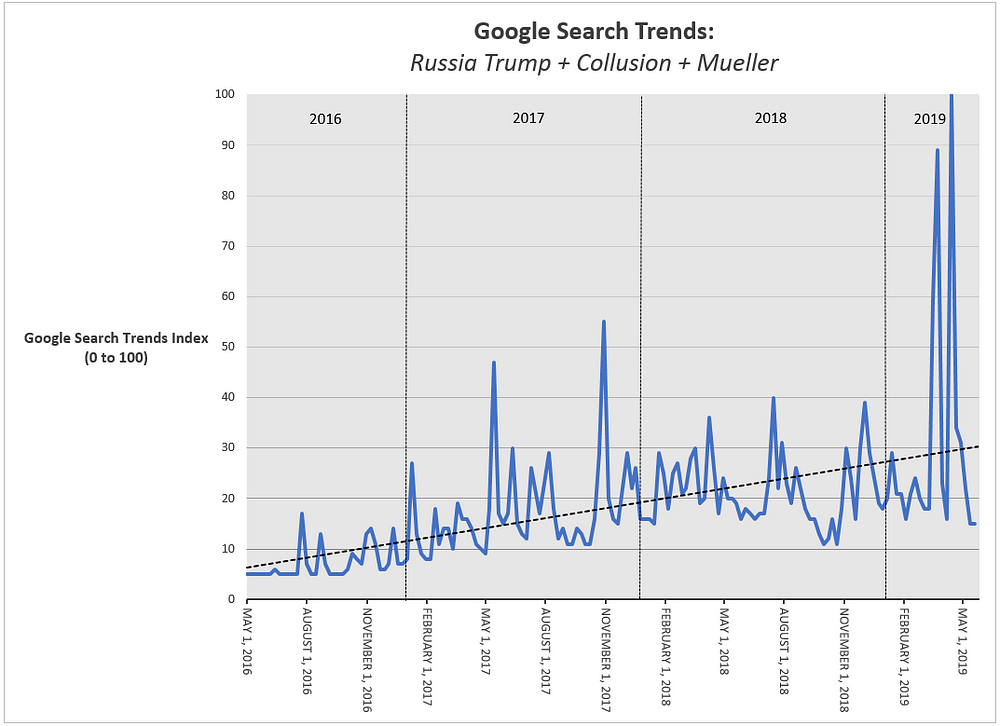By Kent R. Kroeger (Source: NuQum.com; May 24, 2019)
I last wrote the about Trump-Russia collusion investigation in August 2018, promising to myself I wouldn’t return to the story unless genuinely new information emerged.
Since then, with respect to a conspiracy with Russia, the sectarian news media has proffered no new, inculpating evidence against President Donald Trump and his 2016 campaign.
None. Zippo. Nada.
Instead, they recycled old news (e.g., Powerpoint summaries of Trump campaign survey data given to Russian-allied operatives) or blatantly false news (e.g., secret Manafort-Assange meetings in an Ecuadorian embassy) to keep the story alive.
Despite the demonstrably poor journalism, Figure 1 shows how the American public’s interest in Russiagate — as measured by their Google search frequencies on related key terms — has not waned since the start of the story in 2016. If anything, it has increased.
Figure 1: Google Search Trends Related to Russiagate

And why? The obvious source of the continued Russiagate interest is the news media itself, which in the past two years has taken only brief respites from Russiagate to cover stories such as Syria, Venezuela, school shootings, immigration and the Democratic Party’s presidential nomination race.
Jointly, the news media and its consumers are engaged in a strategy investors call ‘averaging down.’ This is an investment approach where, as the value of an asset declines from its original purchase price, the investor buys additional units of that asset in the expectation that it will eventually recover some or all its original value. It is the investor equivalent of continuously moving the bar lower.
Is it a good strategy? Yes, if the asset’s value recovers. Should it not recover, the investor is royally screwed.
In that context, Russiagate, as a common stock, would be valued in pennies right now, having plunged precipitously after the April release of the redacted Mueller report which confirmed what objective observers already suspected: the Trump campaign was amateurish, disorganized, prone to poor judgment, and unethical at times, but it did not conspire with the Russians in the 2016 election to defraud the American people.
Trump’s campaign was unquestionably probed and approached by Russian intelligence operatives (and by Western intelligence operatives as well — as we will find out in the near future), but there was no conspiracy.
The Mueller report is unequivocal on this point:

Suggestions that the Mueller investigation found evidence of a conspiracy — but not enough to indict — is merely the news media employing the ‘averaging down’ strategy and choosing to stay in its advocacy journalism comfort zone, even if it risks losing whatever credibility they still possess.
Left at the conspiracy theory alter by Mueller, the Democrats and the news media are now feverishly trying to convert their shares of the Trump-Russia conspiracy into shares of Trump obstructed justice and must be impeached.
Cable news has become a 24–7 symposium on the legal definitions of obstruction of justice and constitutional theories on impeachment. And if the last two years is an indication, they probably are misleading us on that story too.
Independent journalist Michael Tracey aptly explains the psychology of why the Democrats and the national news media can’t move on from Russiagate and its conspiratorial subsidiaries: “Since 2016, liberals/leftists have perpetuated a moral panic to validate their own parochial political and personal obsessions. They’ve done a lot of damage in the process, not least to people’s psyches. Don’t count on the fever dream ending any time soon.”
Russiagate’s damage is real. This country is not having a constructive dialogue on Libya (where the U.S. seems to be embracing the general — a Virginia resident — trying to take over the country), Yemen (an ongoing humanitarian disaster where there is a lot of blame to pass around), regime change wars(pick any country with oil that the U.S. doesn’t control — Norway, we’re watching you), Medicare-4-All (it is less costly than our current health care system, but if you’ve been watching Jake Tapper, Chris Matthews or Fox News, you wouldn’t know that), climate change (yeah, I would avoid buying coastal or riverbank property going forward), consumer debt (Why does Joe Biden support the Delaware-incorporated bank lenders over student borrowers and credit card consumers? I may have just answered my own question), growing income inequality (that is what a $700 billion defense budget buys), and the list goes on.
Instead, such concerns are mocked for taking our attention away from the media-embellished crisis called Donald Trump (see cartoon below).

Who is stopping these conversations? It is not Donald Trump or Fox News. You are far more likely to get a balanced discussion on Venezuela from Tucker Carlson than you are from Rachel Maddow or Chris Cuomo.
Who is stopping debates on the most important topics of the day? It is the Democratic Party establishment. They are terrified of genuine policy discussions on health care, Venezuela or Iran. Feel free to talk about Peter Buttigieg’s articulateness or Kamala Harris’s favorite music. But ask questions about Venezuela or the dysfunction of our current health care system? Kein Kommentar, says the Democratic Party.
Still, there is hope. The American people are starting to disengage from the mainstream media.
MSNBC and CNN’s ratings are plunging — post-Mueller report.
If we are lucky, this may augur an era of new thinking by the news media. Perhaps they will finally realize it is time to move on from 2016.
- K.R.K.
